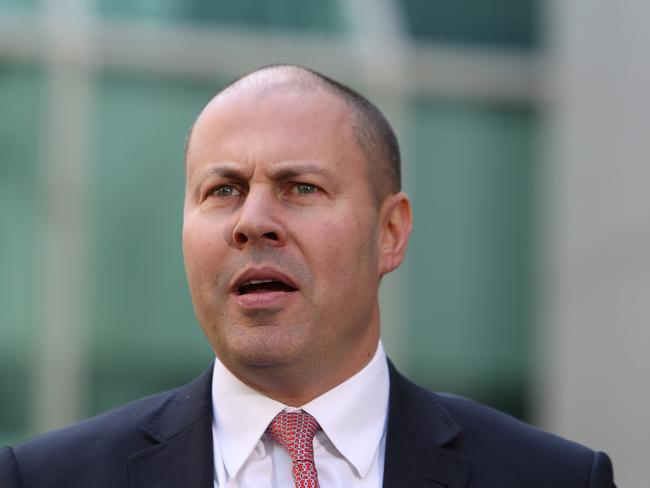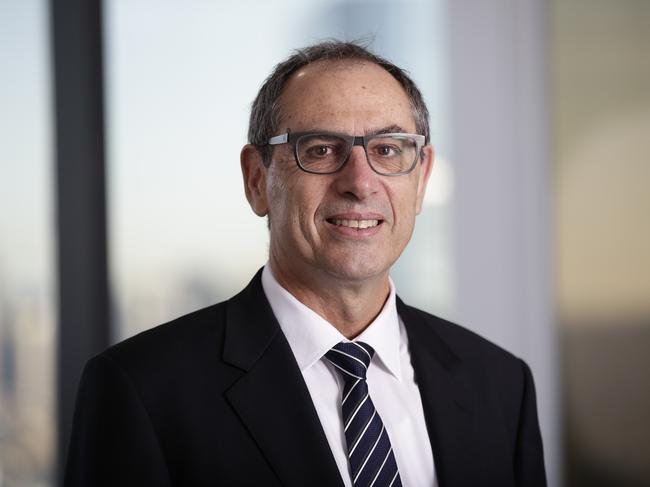Terry McCrann: IMF forecast just reinforces what we can all see
The downgraded IMF report is hardly surprising but what is disturbing is the disconnect between the booming property and share markets — and the reality of world economies, writes Terry McCrann.

Terry McCrann
Don't miss out on the headlines from Terry McCrann. Followed categories will be added to My News.
The big thing to worry about is not the downgraded IMF forecasts for the economy but the disconnect between gloomy economic news and booming property, and especially share markets.
Now the share market is supposed to predict what’s coming down the economic pike. But does anyone seriously believe we — and indeed the entire world — are/is about to be ambushed by an economic boom?
If anything the share market — with Wall St now back to barely 1 per cent below its all-time high — is predicting the exact opposite: that the world is heading for an economic winter of some sort.
Share prices are high — once again, thanks to Wall St; even our market is back within spitting distance of its pre-GFC high — because interest rates right around the world are at or all but at zero.
And that’s not just bank deposit rates, but indeed long-term bonds. Investors are prepared to invest tens of billions of dollars in 30-year German government bonds at a negative rate.
They get nothing in interest every year for 30 years; and at the end slightly less than their original money back!

Why? Because they want safety. At the same time investors are pushing share prices seemingly ever higher in a desperate attempt to get some sort of return.
All of this is at least weird. It’s also extremely disturbing. And it’s far more meaningful than pick-a-number “economic forecasts”.
The IMF was only catching up with the soggy economic reality that has already been exposed in the official statistics — and the much-downgraded RBA forecasts through 2020.
Indeed, you might say the IMF is only now “catching up” with the reality that forced the RBA to cut its official interest rate three times since June.
This is exactly not the time for the federal government to panic and embark on some sort of crazy spending binge. This is not 2008-09 all over again. At least, not yet.
Ironically, Treasurer Josh Frydenberg is on the plane right now, heading for a meeting in Washington of — what else? — the IMF.
He needs to come back and have Treasury — and the RBA — analyse (as best they can) both the data and the anecdotal evidence of what’s happening in the economy through to the mid-year Budget update in early December.
That will tell us the current state of the Budget. It will also tell us what’s best for the economy. By then we might also know where financial markets are headed.
FIRST CHINA, NOW ARABIA
It’s not just China. When you go anywhere into the international business space, life will inevitably get “interesting” and very complicated — no quotation marks necessary.
A company that most Australians have never heard of — Worley Parsons — wants the government’s help via its Foreign Investment Review Board (FIRB), to keep its largest shareholder at bay and specifically out of its boardroom.
Bizarrely in conventional investment terms, that biggest shareholder — a company that even fewer Australians will have heard of, the “Dar Group” — has no representative on the Worley board despite being easily its biggest shareholder with a stake of more than 20 per cent.
Worley wants the FIRB to stop Dar buying more shares via what’s called the “creeping acquisitions” process. It also absolutely rejects any attempt by Dar to form any sort of business relationship.
So who exactly is Worley? Coming out of WA, it’s now one of the world’s biggest providers of engineering services to the energy, chemicals and resources sectors. And who is — the rather mysterious — Dar? It’s a family-owned company in the Middle East which straddles Saudi Arabia, Lebanon and Dubai.
Now you might think that is exactly the sort of company Worley would love to jump into bed with — a company that is well and truly inside the Saudi oil (and Dubai money) tent, so to speak.

But if it did that, it would lock itself out of all sorts of other relationships across the Middle East. And by that I do not mean Israel — but across not just the Sunni-Shi’ite divide, but indeed the even more complicated divisions within Sunni Islam.
It’s sort of like the mess in Syria and indeed in every other country across the top of Africa and in the Middle East being played out in boardrooms and sleek offices rather than on the ground, and (mostly) without the horror and personal tragedy.
Worley tried to “invite” Dar “out” of its share register a year ago when it sprang a massive share issue on it — and indeed all its shareholders.
Worley embarked on a company making (or breaking: time will tell) deal with a US company that could have sliced in half Dar’s stake in it and, just as critically, built a matching stake in the hands of that US company, Jacobs.
But rather than fold its, well, tent, Dar pumped a further $660 million into Worley to maintain its stake above 20 per cent, or double that of the second biggest holder, the incoming Jacobs.
It did so even though it locked in an upfront loss on the new shares as the Worley price plunged dramatically on the merger deal and the huge share issue.
In conventional business terms, Dar’s desire to “creep” and/or get more intimately into bed with Worley is entirely rational.
Before all this started it had a $1.1 billion stake in Worley. It pumped in a further $660 million, making a total of $1.76 billion.
Those shares are now worth just $1.34 billion or so.
Thanks to the Worley deal and share issue it’s now losing a thumping $400 million-plus. It’s entitled to be a tad pissed. It’s understandable it wants to “get inside the Worley tent”.
Equally though, Worley does not want to be dragged exclusively into the Saudi-Lebanese-Dubai orbit.
“Interesting”.

